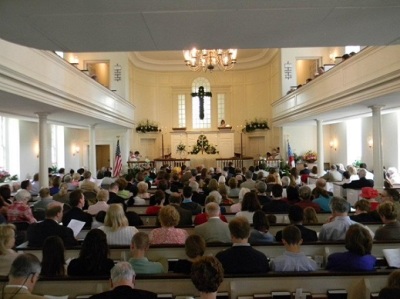Christian Dating Culture (Part 2): Does Church Attendance Impact How Often You Have Sex?
Editor's Note: This is the second part in a series on Christian dating culture. Read Part 1 here.

Christians who attend church and read the Bible at least three times a week are less likely to have sex outside of marriage than those who do not engage in those religious practices.
In a 2012 study of Millenial Christians by the National Association of Evangelicals and Grey Matter Research, only respondents who attended worship services at least once a month were considered. Of the 1,007 polled by NEA and GMR, only 44 percent of unmarried Evangelicals ages 18-29 had had sex.
In contrast, in a ChristianMingle study released in January, only 50 percent of female Christians and 39 percent of Christian males said that they went to church at least once a month. Of the 716 Christians surveyed, 90 percent of them said they would be comfortable with premarital sex and 61 percent without any strings attached.
Reading the Bible also correlates with an individual's likelihood of having sex. In the NAE and GMR study, among those who read the Bible three or more times a week, only 20 percent of them had been sexually active in the past three months, while 60 percent had never had sex. Those who read the Bible with less frequency, "34 percent have been sexualy active recently, while 49 percent have never been sexually active."
Mark Regenerus, an associate professor of sociology at the University of Texas at Austin, concurred with the findings of this research.
"When you see greater religiosity, you're more apt to have measured at the same time a more pronounced awareness of the sexual norms of Orthodox Christian communities and a person's willingness to abide by them," he told The Christian Post in an email.
Regenerus also pointed to the lack of institutions also promoting the church's ethic of abstinence as one reason for the high numbers.
"It's certainly true that unmarried Christian adults are more 'at risk' on sexual matters (attitudes, behaviors), because there are now few (and maybe no other) institutions that reinforce Christian sexual ideals today. And there are more unmarried Christian adults too. So it's a recipe for some cultural clash over sex, for sure," he wrote.
Daniel Weiss, the founder and president of The Brushfires Foundation, whose organization exists to help "people discover and live out God''s design for sexuality and relationships," said that the Church must wake up to the fact that it is not the primary influencer of many Christian young people's sexual ethics.
Weiss pointed to porn as one force that has had a significant impact on revolutionizing mindsets toward sex.
"I think as a Christian community we haven't really contended with the impact of pornography, whose use and acceptance has exploded from the last generation to this generation," Weiss told CP.
"In our culture we only have one dominate sexual worldview and that's the sexual worldview. The church really isn't offering another worldview and I think that's another factor on this Christian Mingle research," said Weiss. "I think our young singles in the church have been thoroughly evangelized by the culture and not been thoroughly evangelized by the church."
Instead of encouraging or discouraging specific religious practices as a means to change Christian sexual behavior, Weiss said that church leadership needs to talk more about pornography and examine what singleness looked like.
"[Church leaders] are just not talking about sexuality at all, so people don't have a sense of how it really fits in with a life of faith," he added. "…The whole world is talking about sex except the church."
Michelle Gonzalez Maldonado, an associate professor of Religious Studies at University of Miami, who has written several books about the intersection of Latinos, Latino America and theology, confirmed the weight that dominant culture has had on shaping a mainstream sexual ethic.
Gonazalez pointed out despite the religiosity of many Latino families (14.2 million Latino Americans consider themselves Protestant or Catholic), as they have assimilated, many children who were born and raised in the United States had taken on values more in line with mainstream American culture, rather than with the "traditional and overwhelmingly Catholic understanding of sex."
"They're still getting [these messages] in their family homes and upbringing, but I also don't think that the church, per se, plays such a strong role," Gonzalez told CP.
Dennis Franck, the national director of single adult ministries for Assemblies of God, said that for the church to be able to offer an alternative viable message, building a strong community is key.
"About 80 percent of churches do not have a single adult group community [where singles can] build caring and trusting friendships," said Franck.
In his own ministry, Franck testified that he had been able to see many singles invest in on another.
"Some of them stayed and cared for each other. Some of them, not all, would watch out for their friends. 'Hey, I'm concerned about you, can we talk?' I think single men and women need to do that with their friends. Now I know it's risky, but a true friend really speaks up," said Franck.





















